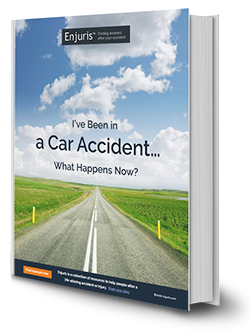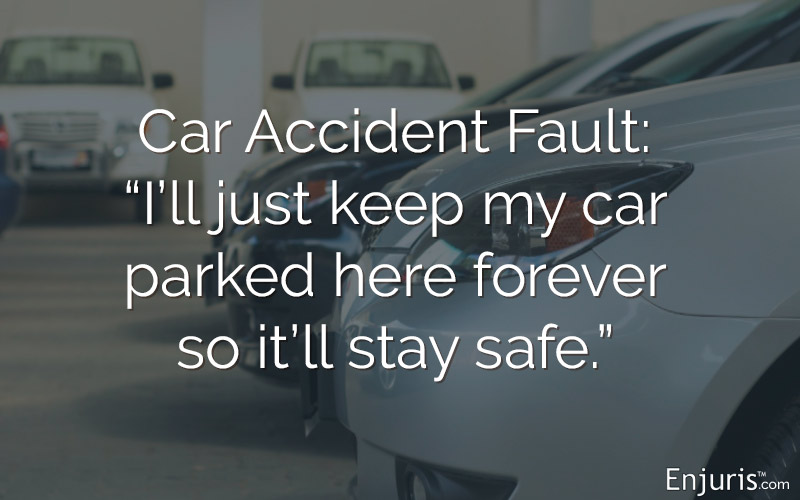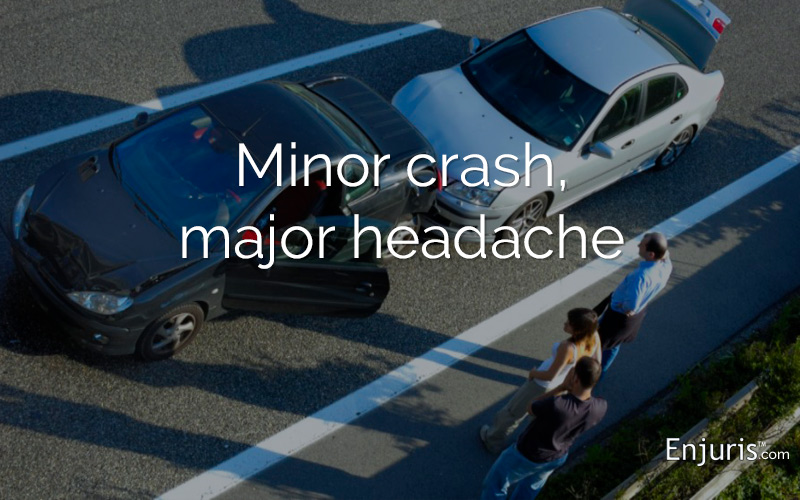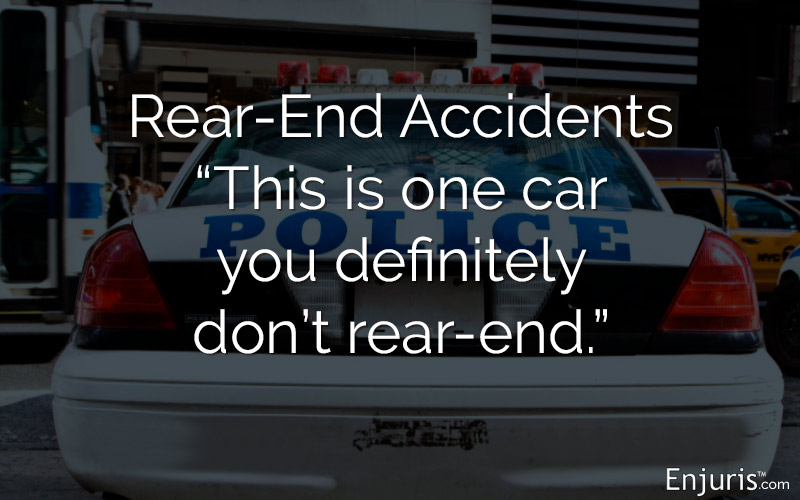Find out what steps to take after a car crash in Alabama
The average Alabama driver has a 90% chance of getting into a car accident in their lifetime, according to the Alabama Department of Transportation (ADOT).
Although you may not be able to avoid a crash, there are steps you can take afterward to improve your chances of recovering damages.
In this guide, we'll take a look at Alabama car accidents, including the laws you should know and the steps you should take after a collision.
Alabama car accident statistics
Motor vehicle accidents have consistently trended upward across the United States (there was a dip in 2020, although fatal crashes increased). Unfortunately, Alabama has not been able to escape this troubling trend.
|
Alabama car accident data (2014-2019)
|
|||
|---|---|---|---|
| Year | Total crashes | Total injuries | Total fatalities |
| 2014 | 133,219 | 39,518 | 821 |
| 2015 | 147,452 | 44,020 | 849 |
| 2016 | 155,907 | 47,653 | 1,089 |
| 2017 | 156,993 | 47,771 | 948 |
| 2018 | 159,925 | 47,419 | 953 |
| 2019 | 159,102 | 46,383 | 930 |
Based on 2019 statistics, the average driver in Alabama has a greater than a 1 in 3 chance of being involved in a serious crash that causes injury or death during their lifetime.
Here are some other alarming Alabama car accident statistics:
- In 2019, a traffic crash was reported every 3 minutes and 18 seconds.
- In 2019, a person was killed in a traffic crash every 9 hours and 26 minutes.
- In 2019, a person was injured in a traffic crash every 11 minutes and 19 seconds.
- A texting driver is 23 times more likely to get into an accident than a non-texting driver.
- More than 20% of children involved in crashes were not in a child restraint or were improperly restrained.
Alabama car accident laws that might impact your claim
Most laws that impact Alabama drivers can be found in Title 32 of the Alabama Code. These laws cover everything from the rules of the road to licensing and insurance requirements.
It's a good idea to familiarize yourself with all the laws found in Title 32. But when it comes to Alabama car accident claims, there are 3 particularly important laws to keep in mind:
- Duty of care. Alabama drivers are required to exercise reasonable care to avoid harming others on the road. If a driver fails to exercise reasonable care (for example, by running a red light), the driver may be considered negligent and held liable for any damages that result.
- Fault state. Alabama is a "fault" state, which means the driver who caused an accident is responsible for the resulting damages. (In "no-fault" states, each driver files a claim with their own insurance company, regardless of who's at fault for the accident.)
- Pure contributory negligence. Alabama is a pure contributory negligence state. This means that if the plaintiff is found to be even 1% at fault for the accident, they are prohibited from recovering any damages.
Alabama auto insurance requirements
All motorists in Alabama are required to maintain the state's minimum amount of liability insurance coverage, which is:
- $25,000 for bodily injury for the death of 1 person
- $50,000 for bodily injury for the death of 2 or more people in any one accident
- $25,000 for damage for the destruction of property in one accident
Keep in mind that liability insurance only covers damages sustained by the other people involved in an accident that's your fault—not your damages. To ensure that your own damages are covered, you'll need to purchase additional optional coverage.
If you're caught driving a motor vehicle or motorcycle without insurance in Alabama, you can receive a $500 fine for the first conviction. For subsequent convictions, you can be fined $1,000 and/or have your license suspended.
More importantly, if you cause an accident as an uninsured driver, you'll be personally liable for any damages that you cause.
Post-accident requirements in Alabama
If you're involved in a car accident in Alabama, there are 3 things you need to do after the crash to avoid a hit-and-run charge:
- Stop your vehicle at the scene of the collision (or as close to the scene as possible),
- Give your name, address, and the registration number of your vehicle to the other drivers involved (or leave this information in a conspicuous place if the car is unoccupied)
- Render reasonable assistance to any person injured (i.e. call an ambulance).
The penalties for failing to take the required post-accident steps range from a fine of $6,000 and/or up to 1 year in prison (for an accident that results in property damage only) to 1-10 years in prison (for an accident that results in injury or death).
Proving fault in an Alabama car accident
To prove fault in an Alabama car accident, you need to establish that someone else was responsible for causing your accident. The legal theory typically used to prove that someone else was responsible is called negligence.
In Alabama, you need to establish 3 elements to prove negligence:
- The driver owed you a duty. All drivers have a duty to exercise reasonable care to avoid harming others on the road.
- The driver breached their duty. To prove that a driver breached their duty, you will have to show that the driver failed to exercise a reasonable degree of care. For example, did the driver run a red light or were they texting while driving?
- You were injured as a result of the driver's breach. It's not enough that the driver failed to exercise reasonable care, you must also prove that their failure caused your accident.
Of course, not all car accidents are caused by other drivers. Other potentially liable parties include:
- Pedestrians
- Passengers
- Property owners
- Car manufacturers
Damages available in an Alabama car accident
We hope that if you're involved in a car accident, it's a minor fender bender. Unfortunately, even accidents that don't result in injury can be costly.
Obviously, the cost of a car accident goes up significantly when injuries are involved. Fortunately, Alabama allows motor vehicle accident victims to recover 3 types of damages:
- Economic damages represent the monetary losses caused by an accident (for example, medical expenses, lost wages, and property damage).
- Non-economic damages represent the non-monetary losses caused by an accident (for example, pain and suffering).
- Punitive damages are intended to punish the defendant. Punitive damages are only available in cases in which the defendant acted intentionally.
Statute of limitations (time limits) for filing a car crash lawsuit in Alabama
Alabama has a 2-year statute of limitations for car accident claims. This means you generally have 2 years from the date of the accident to file a lawsuit. If you fail to file a lawsuit within this period, you will (with very few exceptions) be forever barred from filing a lawsuit based on the accident.
7 critical steps to take after an Alabama car accident
If you aren't sure what to do after a car accident, these 7 steps will get you headed in the right direction.
- Stop your vehicle. Alabama law requires all drivers who are involved in an accident that results in injury or property damage to stop their vehicle, exchange information with the other drivers, and render reasonable aid (for example, call an ambulance) when appropriate. Even if the crash appears to be minor, it's generally a good idea to stop and follow these steps just to be safe.
- Call emergency services. If you suffer an injury in an accident, it's important to call an ambulance. Additionally, whether you're injured or not, it's a good idea to call the police. The police can conduct an investigation and draft a police report (which may help support your insurance claim or personal injury lawsuit). As a bonus, police can help de-escalate potential "road rage" confrontations following an accident.
- Take photographs. It's never too early to start gathering evidence for an insurance claim or personal injury lawsuit. If it's safe to do so, take photographs of the scene (position of the vehicles, traffic signs, weather conditions, skid marks, etc.) along with pictures of any property damage or physical injuries.
- Collect driver and witness information. Witnesses are notoriously difficult to track down days, weeks, or months after an accident. Your best chance is to collect their contact information at the scene of the accident. In addition, you should write down or record the other driver's name, address and phone number, as well as the name of their insurance company and policy number, and license plate number.
Enjuris tip: Consider taking a picture of the other driver's license and license plate with your phone, if possible. This is often a better and faster way to obtain this information because it eliminates the risk of accidentally writing down a wrong number or misspelling a person's name—mistakes which might make pursuing a claim against that person more difficult later on.
- See your doctor. Even if you don't think you were seriously injured in the accident, there are 2 really good reasons to see a doctor after an accident. First, some symptoms don't appear until days or even weeks after an injury is sustained. Second, seeing a doctor signals to the insurance companies and courts that your accident was serious and you did everything you could to mitigate your damages.
- Avoid social media. Despite what you may think, posting about your accident or injuries on social media almost always negatively impacts your personal injury claim.
- Call your insurance company. Even if you don't want to make a claim against your insurance policy initially, you still should report the crash. Some insurance companies won't cover an accident if it's not reported within a certain amount of time. Keep in mind that reporting an accident and making a claim are 2 different things. Even if you're not planning to make a claim, you can still file a report.
Should you talk to an Alabama car accident attorney?
Generally speaking, it's a good idea to hire an attorney after a car accident if any of the following are true:
- You suffered a physical injury in the crash
- Your insurance company denied your claim
- Your insurance company offered to settle your claim for less than you think you deserve
Even if you don't think you need to hire an attorney, you have very little to lose by meeting with a personal injury attorney, as most initial consultations are free.
- Alabama Car Accident Compensation Laws
- Alabama Boat Accident Laws and Personal Injury Claims
- Alabama Distracted Driving Car Accidents: A Guide
- Alabama DUI Laws, Penalties & Car Accident Compensation
- Alabama Hit-and-Run Car Accident Laws for Victims & Perpetrators
- Alabama Minimum Car Insurance Laws, Requirements & FAQs
- Alabama Pedestrian Accident Laws: Who’s At Fault?
- Alabama Plane Crashes & Aviation Accidents: Your Legal Options
- Guide to Alabama Bus Accidents and the Law
- How to Recover Damages After an Alabama Train Accident
- Who's Liable for a Bike Accident in Alabama?
Did you know that car accident law varies by state?
Hurt in a car crash? You may find these resources helpful
Need a lawyer?
What does an injury lawyer do?
A personal injury lawyer helps individuals who have sustained injuries in accidents to recover financial compensation. These funds are often needed to pay for medical treatment, make up for lost wages and provide compensation for injuries suffered. Sometimes a case that seems simple at first may become more complicated. In these cases, consider hiring an experienced personal injury lawyer. Read more
Common car accidents






















